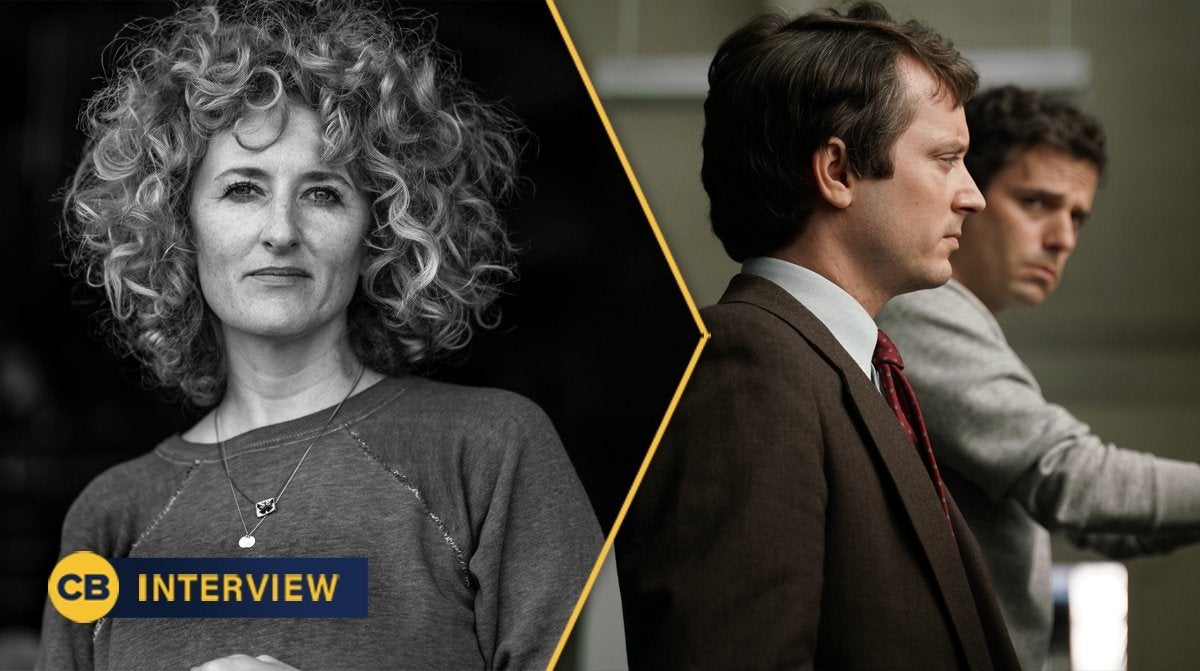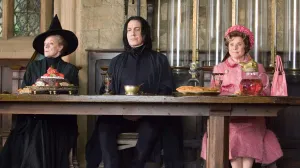Ted Bundy is one of the most notorious serial killers in American history, with his violent exploits being chronicled in a number of projects, exploring both documentary and fictional approaches to the mayhem he caused. Filmmaker Amber Sealey aimed to take a different approach to shedding a different light on Bundy with her film No Man of God, as it depicts the final years of Bundy’s life as he awaits execution and collaborates with the FBI to offer insight into his own mind in hopes of catching more killers. No Man of God hits theaters, On Demand, and Digital HD on August 27th.
Videos by ComicBook.com
The new film is described, “In 1980, Ted Bundy was sentenced to death by electrocution. In the years that followed, he agreed to disclose the details of his crimes, but only to one man. No Man of God is based on the true story of the strange and complicated relationship that developed between FBI agent Bill Hagmaier (Elijah Wood) and an incarcerated Ted Bundy (Luke Kirby) in the years leading to Bundy’s execution.”
ComicBook.com caught up with director Sealey and stars Wood and Kirby to talk their approach to this part of Bundy’s life and the impact it had on them dealing with such harrowing subject matter.

ComicBook.com: I feel like there’s definitely been this resurgence in interest regarding Ted Bundy recently, with Netflix delivering a documentary series and a movie. Now you are tackling a different part of his life and I wondered, what do you think it is about Ted Bundy that he’s getting this, not resurgence in popularity, but a more popular topic? What drew you to this project specifically?
Amber Sealey: Well, I like to pretend that no one else is actually making any other Bundy shows or movies. So, we’re the only ones. Look, there’s always an interest in serial killers, right? I think, probably, Mindhunter brought back interest and there’s often also stuff about, oh God, Son of Sam. Who’s the other one from the ’70s? I’m blank. The guy with the long hair.
Manson?
Sealey: There’s so many of them, and Manson as well. The Night Stalker, that’s who I’m thinking of.
Richard Ramirez.
Sealey: Ramirez, thank you. Honestly, what interested me about this project was not only just the SpectreVision folks and wanting to work with them because I liked them and I thought they were smart and interesting, but, for me, with the material was that I don’t have an interest in serial killers.
Here I am, this sort of like arty, feminist, filmmaker mom. And that, to me, is interesting, that you take that person and what’s their take on a serial killer movie when you’re not a serial killer fan? That was interesting to me. And then, also, I really liked this chamber-piece aspect of the script, that it really focused on the relationship between these two men. Then, most importantly, I liked that it wasn’t actually a Bundy movie. It really is about their relationship. It’s a little bit more about Bill, even though we don’t dive into his personal life too, too much. It’s about how his relationship with Bundy affected him and how he was able to do his job and do it well while also forging a close relationship with someone that he thought was morally reprehensible.
Those are the things that interested me, with, how do you sit so close to evil? What effect did this have on Bill who is a very religious family man? He’s been married for 40-some years. He’s got kids and grandkids who he takes care of and he’s a very upstanding citizen. How does somebody like that sit so close to somebody like Bundy and what does it do to him? Does it change him? So it was those questions that I got hooked by. Was that your question? I feel like I went off on a tangent.
Yeah, that was great. Thank you. Speaking of Bill, Elijah, what do you feel was the biggest challenge of bringing an actual, real-life figure to life for this movie?
Elijah Wood: Oh, man. Well, the fact that he is a living, breathing human and will see the movie and, I think, have an interest as to how he’s represented, certainly weighed on me. But I think just wanting to get certain details right. At the end of the day, the thought process, the research, and then, obviously, conversing with him and asking him those questions does … You get to the set and the process takes over, which was quite lovely. But I think going into that, I just wanted to portray him accurately. And, it’s funny things. It’s like, how did he feel when he walked into the room for the first time?
Was there anxiety? Little tiny details, actually, were the things that I was most interested in and just getting those things right. And then, obviously, under different circumstances, we would have gone out east and I would have spent time with Bill, which I would have really loved to do. I loved talking to him on the phone. He is such a sweet man and was so available, not only to me, so much to the film in general, and to Amber for any question, any detail, and also to Luke. So he really was this grandfather of the movie, in a way, and in a very sweet way. Obviously, I would have loved to have spent more time with him, but the wisdom that he gave me and the answers to certain questions that I had were enough to present the jumping-off point for me, I think.
Similar to that, for you, Luke, what was the emotional toll that playing this pretty horrifying guy took on you, even though you’re not acting out the murders of the crimes that he did? You just have to internalize all of that, I don’t know if “derangement” is the right word, but just that internal violence that he has?
Luke Kirby: I was grateful that that wasn’t an aspect of the story that we were telling, for a multitude of reasons. But, I was compelled by his need to survive by way of rejecting culpability or responsibility to his actions. That spoke to me in a larger context. Culturally, I have seen that behavior present itself, especially in like high seats of power, men who fancy themselves rugged individuals, present themselves as having it all figured out by virtue of their birthright. And the minute that they have been caught in an infraction, they turn tail and immediately reject their responsibility and determine that the world, writ large, is to blame. And that was a compelling aspect.
So it wasn’t especially draining. Although, I will say that I, in playing the game of imagination, I did find the internal life that I imagined this guy lived with, especially as having been caught and having it been the last thing that he would have wanted, he did resemble an ashtray by the end of his life, and that would have taken a toll. He was just a trapped individual by the end. So, yeah, that was taxing.
This is more of just a hypothetical situation, but since Elijah got to communicate with Bill, do you think, if you had the opportunity, if Ted Bundy was still around, would you have wanted to interact with him or reach out to him or people close to him to get better insight or would you have not wanted to get that close and just stick with what the script told you?
Kirby: I think it would have been a very different story if he was around, but I think that if he was, I certainly wouldn’t have had … I don’t think I would have had an issue with it. I probably would have been a bit dubious about how much it would have helped, but I don’t think I would have had too much reluctance. But I didn’t feel the responsibility of upholding his legacy, because it’s all so based, at this point, in mythology and monster stories. And, really, what I … In some ways, I think the only way you can kill that monster is by bringing a human thread back into the story, which I feel like, with Amber’s direction, we were able to achieve.
Maybe this is a question for everybody, but I can let Amber take it if she feels like she wants to, but, early in the film, there’s the scene where Robert Patrick’s character is saying, “All right, who wants this person? Who wants this person? All right, we’ve got Bundy,” and there’s a reluctance from everybody to want to get involved in such a case, because there just seems to be something different about him that sets him apart from all these other people. Culturally, I wonder what you all thought made Ted Bundy so different from Richard Ramirez, Son of Sam, and all these other famed serial killers who might even have a higher body count?
Sealey: We talked about that a lot and thought about it a lot. And I think, one of the things is that Bundy had such an everyman, attractive quality. Ramirez, for example, you look at the guy and you’re like, “Oh wow!” You cross to the other side of the street when you’re walking next to him. But I think that it was the fact that Bundy was able to keep such an active, double life going, that he was respected in his family life and his society, his work. He had these girlfriends that would speak highly of him, and was doing volunteer work at suicide hotlines. I think that it was that he was able to immerse himself in what we would consider “normal society” so well, and then also just visually be normal/appealing.
I think that that’s what shocks people the most, right? When it’s, “He was my neighbor and I always thought he was just so normal and he was a nice guy. He always waved.” So, I think it’s that quality that certainly interests people. And then, I also just think interest builds interest. It’s almost like a snowball effect. I think, for those reasons, Bundy’s become a little bit of a cultural touchpoint and when everyone’s talking about something, we all like to add our voice to the conversation. I think if everyone’s over there talking about something, the rest of us run over and go, “Well, wait, this is what I think.”
Kirby: I also wonder if it wasn’t partly that he just knew how to prevaricate the sh-t out of anything, to the point where it would just be like he was always trying to … Like he was making a meal out of his own story and evading reality. There would’ve been something tiring, so tiring, about having to engage in that personality.
Sealey: Sorry to interrupt you, Luke. I do sort of take issue with the concept that Bundy is so special and that’s why we’re all so fascinated with him. Because what we’re trying to say with this movie is that he’s not really that special, right? I do think that it’s actually, it’s more a commentary. The interest in Bundy is more about us as a society rather than him being really that special to warrant that much interest. Does that make any sense?
Kirby: Yeah. I was just saying, his habitual evasion is not too unfamiliar from other blowhorns that we have seen culturally over the years.
Sealey: It’s almost like Trump. It’s like the interest in Trump generated more interest in Trump. Had we all just stopped listening to him, the interest would have died down.
Kirby: I don’t know if you noticed, but I didn’t mention any names, but that was the point that I was trying to make. Way to get the old heartbeat going again. Here he comes.
Sealey: Don’t put the word “Trump” in the article. But it’s like where we put our attention, it grows, it builds upon itself. So I think, as conscious consumers, we have to be careful with where we put our attention. And, I guess that’s the other part. Yes, it’s a movie about Bundy. Yes, it’s movie about Bill. But I’m also trying to say with the movie, it’s also a movie about us as an audience and where we put our attention. It’s not the main plot point of the movie.
Kirby: I think a lot of people, though, are being taught right now to guide life through their own optic narrative. How they look, how they present themselves. That is very present in the world right now. It’s a real presence and there is a narcissistic quality to it.
Sealey: Is this why you guys are not on Instagram?
Kirby: Oh, I’m on there. I’m on there live right now.
I have to admit, I’m a little confused because I don’t remember in this film this “Trump” guy was that you were talking about. I don’t seem to remember him from the movie. Maybe it was the director’s cut, I don’t know.
Sealey: It’s right at the end. It’s after the credits.
So No Man of God is in the Marvel Cinematic Universe?
Kirby: That’s right. It’s the super, super-secret ending. “I got away with it.”
Elijah, one of my favorite horror films of the past decade was your reboot of Maniac. I know they’re making a new “Ring Lord” TV show, so your movie trilogy’s getting a reboot treatment. Is there a, whether it’s through SpectreVision, to star in or to direct, do you think there’s another lesser-known horror movie that you absolutely love that you’d really like to revive for contemporary audiences?
Wood: Whoa, that’s such a cheeky question. We, personally, have talked a lot about, internally, [A Nightmare on] Elm Street and how incredible it would be to play in that universe again and see that universe, to see Freddy [Krueger] and just that concept be explored again. That’s something that we’re fascinated in. Obviously, that is not a lesser-known, smaller thing that should be remade into a big one. But another one that I feel is exciting, I know that there’s already a remake coming out, but we still really love Children of the Corn. I feel like that would be an exciting thing to … from the ground up, taking it from the novel, not remaking the movie, but actually take the short story and flesh that out in an interesting way.
One of my favorite movies, and not something I necessarily want to remake, but one of my favorite movies that was direct to VHS during the great direct to VHS horror explosion of the 1980s, there’s a movie called “Truth or Dare?: A Critical Madness” by Tim Ritter. I think it sticks out in my mind because I saw it when I was six and it just left an impression on me. But, I genuinely love it. And I’ve introduced it to so many people and it has its fans. It is not that obscure, but I don’t know that I’d want to remake it. When I think about these lesser-known movies, that one always really sticks out as a special little gem.
*****
No Man of God hits theaters, On Demand, and Digital HD on August 27th.
This interview has been edited for length and clarity. You can contact Patrick Cavanaugh directly on Twitter.








